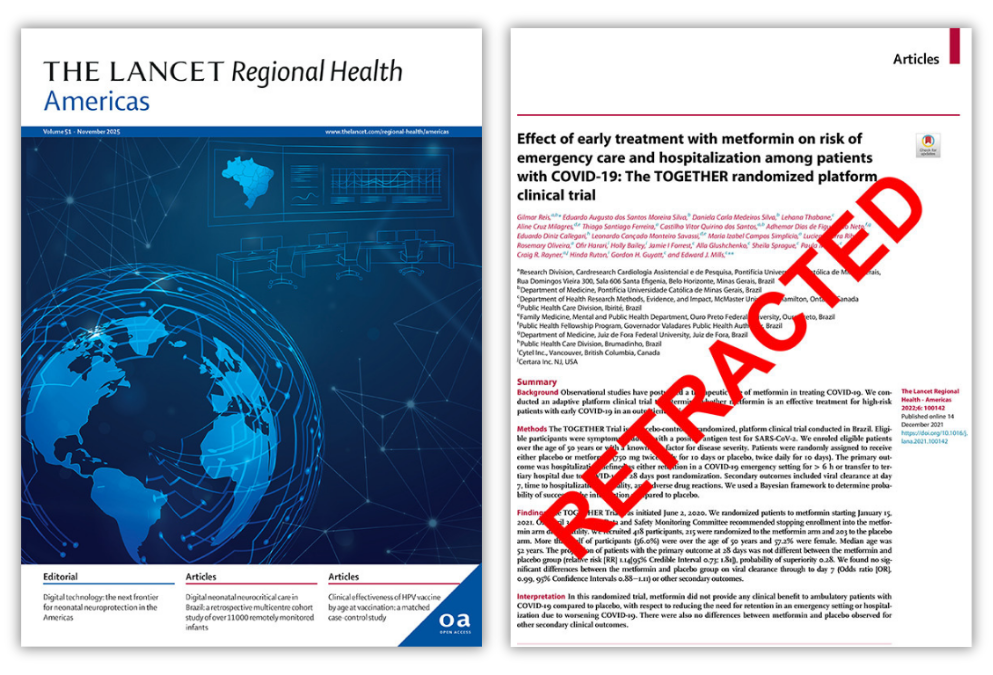
A paper on a clinical trial of metformin for the treatment of COVID-19 has been retracted nearly two years after the authors flagged data issues that resulted in an expression of concern.
The results of the Brazil-based TOGETHER trial, published in December 2021 in The Lancet Regional Health–Americas, found metformin was no better than placebo at improving health outcomes in people with COVID-19. The study has been cited 45 times, 25 of which came after the expression of concern was published, according to Clarivate’s Web of Science.
Early observational studies in people with COVID-19 found positive effects of metformin, an oral medication most often used for type 2 diabetes, including reduced disease severity and mortality rates. But clinical trials, including the now-retracted study and a more recent randomized trial, found no differences in time to recovery or disease severity between patients who got metformin and those who received placebo.
The authors of the now-retracted study requested a correction to the article in 2023 after realizing they had included an incorrect number of primary outcome events when reporting the results, Edward Mills, a professor of health research methods at McMaster University in Hamilton, Ontario, and the corresponding author of the paper, told us. As we reported in April, the journal issued an expression of concern in February 2024, citing “errors in the total population considered for the analysis.”
The journal retracted the article on October 21. The “unintentional” error by the authors “led to an inappropriate decision to stop the trial,” meaning the reliability of the findings was “compromised,” according to the retraction notice. The corrected number of events provided by the authors “modified the effect size and no longer supports the original conclusions,” the notice continues.
Mills told us the authors “understand the journal’s caution about printing a trial that was stopped for futility, but no longer meets the stopping rules.” However, he also said the authors stand by the findings of the original study: “metformin was and is not an effective drug for treatment of acute COVID 19 illness.”
The study joins our list of more than 600 retracted papers about COVID-19.
As we previously reported, the journal asked McMaster University to investigate after the authors requested the correction. The university did not respond to our request for an update on the investigation.
Infectious disease researchers David Boulware and Todd Lee noted in a 2024 letter that 12 percent of the patients in the control arm of the study were taking metformin prior to the start of the study. “Including metformin in the control group would bias the study toward the null while potentially also leading to toxicity in the metformin group,”” they wrote.
But the question is “almost academic” at this point, Lee told us this week. ACTIV-6, a clinical trial that included nearly 3,000 patients and published in July in JAMA Internal Medicine, “failed to replicate the original promise of metformin for COVID-19,” he said.
The TOGETHER trial was a multi-arm clinical trial testing different drugs in people with COVID-19 at high risk for complications of the disease. It took place in 13 clinics in Brazil. The metformin arm, which began treating patients in January 2021, stopped that April after the safety committee determined the drug was not affecting health outcomes.
Other arms of the trial tested ivermectin, hydroxychloroquine and fluvoxamine, among other drugs.
Like Retraction Watch? You can make a tax-deductible contribution to support our work, follow us on X or Bluesky, like us on Facebook, follow us on LinkedIn, add us to your RSS reader, or subscribe to our daily digest. If you find a retraction that’s not in our database, you can let us know here. For comments or feedback, email us at [email protected].
Hey, The Lancet are getting quicker! Only 2 years this time, down from 12 years to retract Wakefield’s infamous vaccine-autism article.